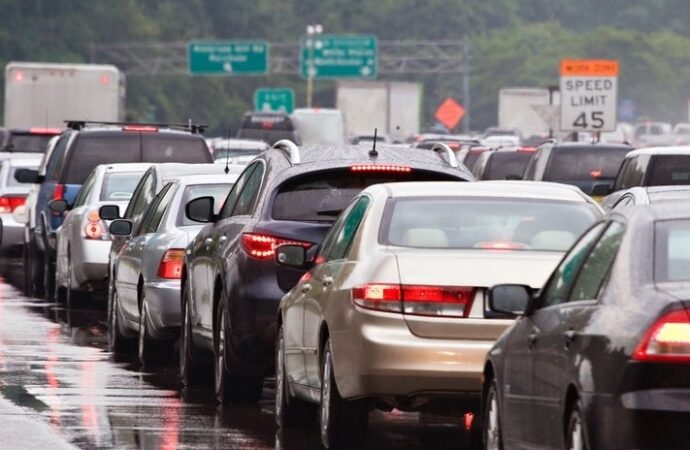Skip to main content Lincoln Park, IL Bucktown-Wicker Park, IL Lake View, IL North Center-Roscoe Village, IL Hyde Park, IL West Side, IL South Side, IL Lincoln Square, IL Oak Park-River Forest, IL Forest Park, IL Illinois Top National News See All Communities CHICAGO, IL — It’s an undeniable fact: The coronavirus pandemic wreaked havoc
CHICAGO, IL — It’s an undeniable fact: The coronavirus pandemic wreaked havoc on a variety of industries in 2020, causing unprecedented disruption to the U.S. economy as well as the daily lives of most Americans.
While travel was among the most affected industries, drivers in Chicago and other U.S. cities actually benefited from the disorder, spending less time in the car last year and saving money as a result.
The average American driver in 2020 lost only 26 hours of time to congestion on U.S. roadways, down from 99 hours in 2019, according to the 2020 Global Traffic Scorecard by transportation analytics firm INRIX. Because they spent less time in their vehicles, Americans saved an average of $980 per driver.
Overall, U.S. drivers saved more than 3.4 billion hours and $51 billion in time savings compared to 2019.
“COVID-19 has completely transformed when, where and how people move,” Bob Pishue, transportation analyst at INRIX, said in a release. “Government restrictions and the continued spread of the virus led to shifts in travel behavior seemingly overnight. Morning commutes in cities across the world went without delay as people reduced auto and transit travel to offices, schools, shopping centers and other public spaces.”
In Chicago, drivers lost about 86 hours to congestion in 2020, down 40 percent from 2019. On average, drivers in our city saved $889 last year, according to the scorecard. Collisions in Chicago were also down five percent.
The purpose of the scorecard, according to INRIX, is to provide a quantifiable benchmark for governments to improve traffic mobility in their cities.
To compile the rankings, INRIX looks at trips made by identifying the most-frequented routes and destinations within a region. INRIX then calculates the additional time it takes to travel those routes with traffic and delays.
Ultimately, the scorecard ranks 1,000 cities in 50 countries.
To read more about the methodology, you can find the full report here.
Fourth-ranked Boston, which ranked first in 2019 with 101 hours lost, saw a 68 percent decrease in delay compared with last year. Meanwhile, Washington, D.C., saw the largest change in congestion — delay there fell 77 percent from 2019.
On the other hand, drivers in New York lost the most time in traffic in 2020 — 100 hours total, representing an only 28 percent drop from 2019. Coming in behind New York City is Philadelphia (94 hours) and Chicago (86 hours).
New York City is also home to three of the top five most-congested U.S. roadways, according to the report. Meanwhile, the title of most-congested roadway went to Chicago’s Eisenhower Expressway from the I-290/294 interchange to the I-90/94 interchange, while the fifth most-congested road can be found on San Francisco’s Interstate 680 from Mission Boulevard to Scotts Corner.
New York City, Philadelphia and Chicago all made the list for the most congested cities in the world. New York City ranked third, Philadelphia ranked fifth and Chicago came in seventh.
Bogota, Colombia, is the worst city in the world for traffic congestion, according to the report, where drivers spend 133 hours in traffic on average in a year.
Here are the nation’s 10 most congested urban areas, according to INRIX, along with hours lost by drivers in 2020. See the full scorecard here.
- New York City (100 hours)
- Philadelphia (94 hours)
- Chicago (86 hours)
- Boston (48 hours)
- Los Angeles (45 hours)
- San Francisco (47 hours)
- New Orleans (42 hours)
- Houston (35 hours)
- Miami (35 hours)
- Dallas (34 hours)
The rules of replying:
- Be respectful. This is a space for friendly local discussions. No racist, discriminatory, vulgar or threatening language will be tolerated.
- Be transparent. Use your real name, and back up your claims.
- Keep it local and relevant. Make sure your replies stay on topic.
- Review the Patch Community Guidelines.



























Leave a Comment
Your email address will not be published. Required fields are marked with *